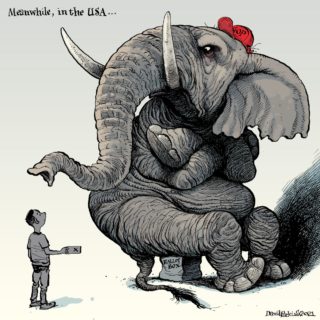The federal government faces increasing pressure to enact sanctions against officials in Hong Kong and mainland China who are responsible for human rights violations, despite threats of retaliation from China’s envoy to Canada.
The pro-democracy group Canadian Friends of Hong Kong plans to send a letter to Prime Minister Justin Trudeau on Monday urging the federal government to target Chinese officials who are directly implicated in police brutality against democracy activists in Hong Kong, as the United States does.
The letter said sanctions should also apply to Mainland Chinese officials involved in the suppression of Tibet and the detention of one million Muslim Uyghurs in internment camps in the western Xinjiang region.
Conservative Senators Leo Housakos and Thanh Hai Ngo also plan to table a motion in the Senate this week that calls on Canada to impose sanctions against Chinese officials “relating to the ongoing protests in Hong Kong and of the systematic persecution of minority Muslims in China.”
Canada and the United States have laws that allow them to impose asset freezes and travel bans on human-rights abusers from around the world. Canada has used its two-year-old law to sanction officials of Russia, Venezuela, Myanmar, Saudi Arabia and South Sudan.
“The Justice for Victims of Corrupt Foreign Officials Act will be meaningless if we don’t use it when it is needed,” the letter says of the legislation referred to as a Magnitsky law. “Even worse, it would be a complete mockery of our stand on human rights and justice if we only dare to apply this act to countries that we deem as not powerful.”
The letter to Mr. Trudeau was co-signed by the Uyghur Relief Fund and Canada-Tibet Committee and other pro-democracy groups.
Amnesty International and other human-rights organizations have documented beatings, torture and arbitrary arrests by Hong Kong police in the past six months as authorities tried to quell protests against proposed legislative changes that would have allowed extraditions to Mainland China.
China’s ambassador to Canada, Cong Peiwu, warned recently that any effort to impose sanctions on Chinese officials over Hong Kong and the detentions in Xinjiang would cause “very bad damage in our bilateral relationship,” and result in “very firm countermeasures.”
China arrested two Canadians – Michael Spavor and Michael Kovrig – and blocked key agricultural exports after Canada detained Meng Wanzhou, a senior executive of Huawei Technologies, last December on a U.S. extradition warrant. She is accused of fraud relating to U.S. sanctions against Iran.
Mr. Housakos said Mr. Trudeau should not be frightened off by the Chinese envoy’s threats.
“It shows once again they [China] constantly believe they can push the Canadian government around and can slap our Prime Minister around. They have shown very little respect for our country,” he said. “It is sad that it has come to the point where a number of senators feel compelled that we have to do this because the Trudeau government isn’t fighting for these values.”
The Prime Minister was non-committal when asked at the end of the NATO summit in London last week whether Canada would impose sanctions.
“We have Magnitsky legislation that we are looking at using in different ways, but we have not made any determination at this point,” he told reporters.
Sanctions laws in Canada, the United States, the United Kingdom and other Western countries honour Russian tax lawyer Sergei Magnitsky, who was beaten to death by Moscow prison staff in 2009 after accusing Russian officials of a massive tax fraud.
Last month, the U.S. President signed a new law, passed with bipartisan support, to back protesters in Hong Kong and threaten China with sanctions, including visa bans and asset freezes, if it does not maintain Hong Kong’s autonomy from Beijing.
The text of the U.S. legislation also says Washington should work with allies such as Canada “to promote democracy and human rights in Hong Kong.”
Natalie Hui, a human-rights activist with Friends of Hong Kong, said her group would support the introduction of legislation similar to that of the United States, but for now she said Ottawa should use its Magnitsky law to punish Chinese human-rights abusers.
Wenran Jiang, a senior fellow at the University of British Columbia’s Institute of Asian Research, said it would be wrong to sanction Hong Kong or Chinese officials for the human-rights abuses.
He said that would put Canada on Washington’s side in a confrontation he argued is driven more by the U.S. trade war with Beijing than human rights.
“Should we actually sign on with the American political agenda?” he said. “That would further anger the Chinese authorities.”
Prof. Jiang said that would be unwise, given that relations are already strained. He said Hongkongers clearly have democratic aspirations and resent interference from Beijing. But he doesn’t believe most people in the semi-autonomous region support what he called the “blackshirts” and “rioters” and “radicals” among the protesters.
ROBERT FIFE, OTTAWA BUREAU CHIEF
STEVEN CHASE
The Globe and Mail, December 9, 2019

